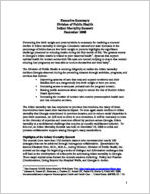Executive Summary Division of Public Health Infant Mortality Summit
December 2008
Preventing low birth weight and preterm births is necessary for realizing a renewed decline in infant mortality in Georgia. Consistent national and state increases in the percentage of births that are low birth weight or preterm highlights the significant challenge presented to reducing deaths during the first month of life. The greatest excess in Georgia's infant deaths is related to poor maternal health1. Systems that support optimal health for women across their life-span are needed; helping to ensure that women entering into pregnancy are best able to nurture themselves and their baby2.
The Division of Public Health is working diligently to realize the infant mortality declines Georgia observed during the preceding decades through activities, programs, and services that include:
Improving systems of care that treat and support newborns and their families born at a dangerously low birth weight or born pre-term;
Increasing access to adequate prenatal care for pregnant women; Raising public awareness about ways to reduce the risk of Sudden Infant
Death Syndrome; Increasing the number of women who receive preconception health care
and risk reduction services.
The infant mortality rate has responded to previous interventions, but many of these interventions have made their maximum impact. To once again attain declines in infant mortality that Georgia experienced in previous decades, and to reduce racial disparities in poor birth outcomes, we will need to think in new directions. It will be necessary to draw on the diversity of expertise and resources offered by partners across Georgia. Infant mortality is a multifaceted challenge that requires an equally multifaceted solution. To this end, an Infant Mortality Summit was held on December 19, 2008 to enlist and promote collaborative support among Georgia's many stakeholders.
Highlights of the Infant Mortality Summit The summit drew more than 150 decision makers who recommended nearly 100 strategies that can be achieved through interagency collaboration. Spearheaded by Sandra Elizabeth Ford, M.D., M.B.A., Acting Director, Division of Public Health, the summit set the stage for beginning a series of dialogue and information exchanges that will lead to the development of a blueprint for addressing infant mortality in Georgia. Three major topical areas framed the summit sessions including: Policy and Practice Considerations, Going Beyond the Hospital Walls, and Georgia in Action.
1 Data Sources: OASIS Infant Mortality Web Query Tool, http://oasis.state.ga.us/oasis/qryIMort.aspx 2 Johnson K, Posner SF, Biermann, J, Cordero JF, Atrash HK, Parker CS, Boulet S, Curtis MG. 2006. Recommendations to Improve Preconception Health and Health Care --- United States. MMWR; 55: 1-23.
1
In addition to featuring national and state experts, the summit highlighted selected best practices that are being implemented currently in local communities in the state to decrease infant mortality.
Summary of the Issues The rich dialogue and exchange during the summit spotlighted issues in the following areas:
Reproductive health of women should be addressed across their lifespan. An increased focus is needed on men's health. The role of racism in infant mortality disparities needs to be acknowledged and
addressed. There is a lack of information on infant mortality among Georgia's Hispanic
community. Infant mortality is a complex issue that requires multiple partners and solutions. There is a need to collaboratively identify and implement best practices at the
community level that go beyond the clinical perspective.
Summary of Recommended Actions Through participation in luncheon dialogues and action planning sessions, decision makers offered numerous actions that can be taken to further decrease Georgia's infant mortality rate. Collectively, the themes of the recommended actions are as follows:
Support optimal health for women across their reproductive lifespan. Enhance men's health care resources. Identify and implement an array of holistic best practices. Increase policymakers' understanding and support. Increase community, state, and federal communication, collaboration, and
coordination around infant mortality issues. Increase community focus and impact in high infant mortality areas.
Next Steps Much was learned from the 150 decision makers that came together on December 19, 2008. However, the work in reducing infant mortality in Georgia has just begun. While most of the issues are not new, it is clear that a multi-faceted inter- and intra- agency approach is needed that is supported by innovative strategies that are capable of being customized at the community level. As this work begins, next steps include:
Continuing dialogue with existing and new partners through additional forums that tap into shared wisdom and expertise.
Using Summit feedback and other forums to develop a multi-agency blueprint to address infant mortality in Georgia.
Mobilizing communities to identify and implement best practices to address their unique infant mortality issues.
2
This executive summary and the summit's proceeding are posted on the Public Health website: http://health.state.ga.us/publications/reports.asp
Links for viewing the summit sessions:
Session I: Policy and Practice Considerations:
http://web.dhr.state.ga.us/ph/infantmortalitysummit1
Session II: Going Beyond the Hospital Walls:
http://web.dhr.state.ga.us/ph/infantmortalitysummit2
Session III: Georgia in Action:
http://web.dhr.state.ga.us/ph/infantmortalitysummit3
On site interviews: RADM Clara H. Cobb, RN, MSN, FNP, Assistant Surgeon General, USPHS, Regional Health Administrator http://web.dhr.state.ga.us/ph/Summit_Cobb5/index.html Wanda D. Barfield, MD, MPH, Senior Medical Epidemiologist, CDC http://web.dhr.state.ga.us/ph/Summit_Barfield3a/index.html Fleda Mask Jackson, Ph.D, Senior Scientist, Atlanta Regional Forum http://web.dhr.state.ga.us/ph/Summit_Jackson4a/index.html Flavia Mercado, MD, Medical Director Dept. of Multi-Cultural Affairs, Grady Memorial Hospital & Assistant Professor of Pediatrics, Emory School of Medicine http://web.dhr.state.ga.us/ph/Summit_Mercado_2/index.html Leonard Reeves, MD, FAAFP, Family Medicine Residency, Assistant Program Director http://web.dhr.state.ga.us/ph/Summit_Reeves2/index.html
3
